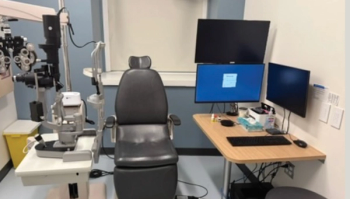
Physician education boosts interaction
Strategy can improve patient compliance with glaucoma medication regimens.
The quality of communication between ophthalmologists and their patients with glaucoma can be improved by physician education. Better patient–physician interactions may improve patients' compliance with their glaucoma medication regimen, said Dr David S. Friedman, MPH, PhD, during glaucoma subspeciality day at the 2010 annual meeting of the American Academy of Ophthalmology.
Findings from various studies support targeting patient–physician interactions as a means to improve medication adherence. For example, it has been shown that patients who express little concern about reduced vision from glaucoma are less adherent with their medications than their counterparts who are more concerned about how they may be affected by glaucoma in the future.
Improved adherence
To explore whether improving patient–physician interaction is a viable pathway to improving patient medication adherence, Dr Friedman and colleagues analysed interactions between ophthalmologists and their patients with glaucoma to evaluate the effect of a simple educational intervention to improve the quality of the physician-patient communication.
They recruited 23 practitioners from three East Coast states who agreed to have their patients' visits audio- and videotaped before and 2 months after the physicians participated in an educational programme on adherence and communication.
Physician participants were predominantly male and were seasoned practitioners with an average age of 53 years. Fifty routine follow-up visits for patients with glaucoma were recorded before and after the educational intervention.
Prior to the intervention, physicians did most of the talking and mainly discussed IOP. Even when visual fields and optic nerve imaging were performed, those tests were discussed just about two-thirds and one-half of the time, respectively. The physicians dominated the conversation in terms of words spoken and questions asked, and yet questioning about adherence-related issues rarely took place.
Overall, physicians did not focus on how patients were doing with therapies. Potential barriers to adherence, such as medication side effects and difficulties with administration mechanics, were asked about less than 40% of the time, and physicians rarely tried to assess a patient's understanding about glaucoma, disease-related concerns, or medication-related experiences and attitudes, Dr Friedman said.
"We know that asking patients if they have additional questions can open the door to addressing the patients' problems, but only 18% of the visits culminated with the ophthalmologist asking the patient if he or she had questions," he said.
Physicians also performed poorly in identifying medication non-adherence. Based on their visits, they detected non-adherence as an issue in three of the 50 patients. However, in a follow-up Q&A with a trained research interviewer conducted after the physician visit, 12 patients admitted to medication nonadherence.
After the 50 visits were completed, the physicians participated in a 3-hour educational programme that focused on four basic steps for improving communication:
The programme significantly changed physician behaviour and tripled the ability to detect non-adherence from 25% to 78%. However, it is unknown whether improved communication led to better adherence because patients were not followed after postintervention visits.
"Nevertheless, improved communication is a tremendous opportunity, and I would urge all ophthalmologists to incorporate these methods into their practice," Dr Friedman concluded.
Dr David S. Friedman, MPH, PhD, is Alfred Sommer Professor of Ophthalmology at the Wilmer Eye Institute, Johns Hopkins University School of Medicine, Baltimore, Maryland, USA. He can be contacted via E-mail:
Dr Friedman did not indicate any financial interest in the subject matter.
Newsletter
Get the essential updates shaping the future of pharma manufacturing and compliance—subscribe today to Pharmaceutical Technology and never miss a breakthrough.




























